What is Decision Making?
Decision making is a cognitive process that involves choosing a course of action from multiple alternatives. It is a crucial skill that we use every day to navigate through life’s challenges and opportunities. Whether it’s deciding what to have for breakfast or choosing a career path, decision making plays a significant role in shaping our lives.
There are different types of decision making, including:
- Rational decision making: This approach involves systematically analyzing all possible options and choosing the one that maximizes benefits and minimizes risks.
- Intuitive decision making: This method relies on gut feelings and instincts rather than logical analysis.
- Emotional decision making: Emotions play a key role in this type of decision making, influencing the choices we make.
Factors that can influence decision making include personal values, beliefs, past experiences, external influences, and cognitive biases. Understanding these factors can help individuals make more informed and effective decisions.
Effective decision making requires critical thinking skills, problem-solving abilities, and the ability to weigh pros and cons. It also involves considering short-term and long-term consequences of choices and being open to adapting decisions based on new information.
In conclusion, decision making is an essential aspect of human behavior that impacts every aspect of our lives. By understanding the process of decision making and developing strategies to improve it, individuals can make better choices that lead to positive outcomes.
Mastering the Art of Decision-Making: 8 Essential Tips for Effective Choices
- Define the decision that needs to be made.
- Gather relevant information and data.
- Consider all possible options or alternatives.
- Evaluate the potential outcomes of each option.
- Make a decision based on logic and analysis, not just emotions.
- Consider the risks and benefits of each option.
- Seek input or advice from others if needed.
- Be prepared to adapt and adjust your decision as needed.
Define the decision that needs to be made.
Defining the decision that needs to be made is a critical first step in the decision-making process. By clearly identifying the problem or choice at hand, individuals can focus their efforts on finding relevant information, evaluating options, and ultimately making a well-informed decision. Without a clear understanding of the decision that needs to be made, it can be challenging to proceed effectively and efficiently. Therefore, taking the time to define the decision ensures that all subsequent steps in the decision-making process are aligned with addressing the core issue at hand.
Gather relevant information and data.
Gathering relevant information and data is a crucial step in the decision-making process. By collecting all pertinent facts, figures, and details related to the decision at hand, individuals can make more informed and rational choices. This information provides a solid foundation for evaluating options, assessing risks, and predicting outcomes. Without thorough research and data gathering, decisions may be based on assumptions or incomplete information, leading to potential errors or regrets. Therefore, taking the time to gather relevant information is essential for making sound decisions that align with one’s goals and objectives.
Consider all possible options or alternatives.
When it comes to decision making, a crucial tip to keep in mind is to consider all possible options or alternatives before making a choice. By thoroughly exploring different avenues and weighing the pros and cons of each option, individuals can make more informed and effective decisions that align with their goals and values. Taking the time to consider all possible alternatives can lead to better outcomes and help avoid potential regrets in the future.
Evaluate the potential outcomes of each option.
When making decisions, it is important to evaluate the potential outcomes of each option. By carefully considering the possible consequences of each choice, individuals can make more informed decisions that align with their goals and values. Assessing the potential outcomes helps in weighing the risks and benefits of each option, ultimately leading to a decision that is well-thought-out and likely to yield favorable results.
Make a decision based on logic and analysis, not just emotions.
When making decisions, it is important to prioritize logic and analysis over emotions. Emotions can cloud judgment and lead to impulsive choices that may not be in our best interest in the long run. By taking a step back, evaluating the options objectively, and considering the facts and data at hand, we can make more rational and informed decisions that are likely to yield better outcomes.
Consider the risks and benefits of each option.
When engaging in the decision-making process, it is essential to carefully consider the risks and benefits associated with each available option. Evaluating the potential advantages and disadvantages of a decision allows individuals to make informed choices that align with their goals and values. By weighing the risks and benefits, one can assess the potential outcomes and make a more strategic decision that maximizes benefits while minimizing potential negative consequences.
Seek input or advice from others if needed.
Seeking input or advice from others can be a valuable strategy in the decision-making process. By consulting with others, you can gain different perspectives, insights, and expertise that you may not have considered on your own. This collaborative approach can help you make more well-rounded and informed decisions, leading to better outcomes. Don’t hesitate to reach out to trusted individuals for their opinions and guidance when facing important choices.
Be prepared to adapt and adjust your decision as needed.
Being prepared to adapt and adjust your decision as needed is a key aspect of effective decision making. Flexibility is crucial in navigating the complexities of choices and outcomes. By remaining open to new information and feedback, you can make necessary adjustments to ensure that your decisions align with changing circumstances and goals. Embracing adaptability allows for growth, learning, and ultimately leads to more successful outcomes in the decision-making process.




